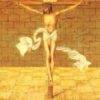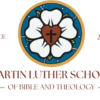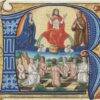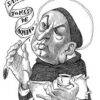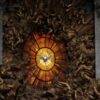Tag: Theology
The Vultures Have No Knowledge of God’s Kingdom: Living in the Theology of the Cross
for we walk by faith, not by sight . . .[1] It is certain that man must utterly despair of his own ability before he is prepared to receive the grace of Christ. That person does not deserve to be called a theologian who looks upon the »invisible« things of God as though they were clearly »perceptible in those things which have actually happened« (Rom. 1:20; cf. 1 Cor 1:21-25), he deserves to be called a theologian, however, who comprehends the visible and manifest things of God seen through suffering and the cross. A theology of glory calls evil good and good…
Theological Academia Juxtaposed with a Theology of the Crucis
I think a lot of people involved in theological academics are driven by a competitiveness equal to professional athletes. There is this desire to over-excel in such a way that they out produce, or equally produce, by way of quantity and quality, with reference to their academic publishing (and other accolades). A constant need to prove to themselves, and others, that they are at the top of the game, and have achieved where most others have failed (or not even aspired to). The irony of this type of drivenness is that it is antithetical to a theology of the cross….
Made an Assistant Professor of Theology
I have been made an Assistant Professor of Theology at Martin Luther School of Bible and Theology. I want to thank, in particular, Dr. Enrique Ramos and Dr. Fred Macharia for thinking of me this way, and giving me this opportunity to minister to and serve the church of Jesus Christ in this way. I am honored. And if you are looking for a place to study theology and the Bible in deep and ministerial ways, then do consider applying to MLSBT. The MLSBT website I am linking to is new and under construction (as far as the academics page)….
Athanasius as an Antidote to Federal Theology
I often speak of T. F. Torrance’s view of the atonement as the ontological view, which is inextricably related, for Torrance to the Incarnation (which is why his most recent posthumously published books Incarnation & Atonement came in the order that they did — there is a theo-logical and even, dare I say it, necessary relation between the two). Well I just wanted to quote Athanasius directly, so that folks won’t think that Torrance fabricated such things out of whole cloth. Here’s Athanasius discussing the apparent dilemma God has set before Him given the reality of the “Fall” (and the non-existence or non-being that it brought humanity separated from…
The Eschatological Nature of Christian Theology
There is no reason to absolutize any period of theological history, per se. In other words, every season of theological development, within the Church’s history, is open for engagement. The Lord Himself said He would build His Church, and through Paul continued to say that He would, in particular, provide pastors and teachers, so on and so forth. This ought to teach us that Christ has been present, all along, in His Church. He hasn’t abandoned it or left it as orphans, but has provided His Holy Spirit to presence Himself and sacra doctrina among those who fellowship with Him…
The Work of Christ is the Person of Christ: Against Dualistic Classical Theology
When the work of Christ is separated from the person of Christ, all you can be left with are either pure Pelagian or semi-Pelagian doctrines of salvation; as that becomes funded by some functional type of an adoptionistic christology (e.g., Ebionism etc.) This is why TFT refers to the Latin Heresy: he is referring to theologies, Western-Augustinian ones, that ultimately don’t think salvation, as both objectified and subjectivized in the Monarxia of God in the person of Jesus Christ. When this or that individual person is understood as being “elect” of God, based on an arbitrary and hidden decree of…
Theological Science, au contraire to the Natural Theology of the Schoolmen
The following is a highly overlooked point, particularly with reference to Christian theology. What, or more pointedly, Who is theology’s control? The answer to this question drives what I attempt to be all about, when it comes to doing prayerful and dialogical theology. We could ask this question another way: is there an order, a taxis, to doing Christian theology; an order that takes into account a thoughtful and intentional theological ontology? These are important questions, and ones that I rarely see engaged with within the received theologies of much of evangelical Lutheran and Reformed theologies. It is just presupposed…
A Devotion On Against Natural Theology
Just because something happens in Church history, gains some sort of consensus of the so-called faithful, this does not (or should not) lead to the notion that God caused whatever happened to happen; whether it be related to some form and development of church government, some doctrinal development, so on and so forth. As Protestant Christians, we OUGHT to repudiate these types of natural theologies; the types where it is asserted a priori that the way the consensus decided just is the will of God for the Church’s edification. It may or may not be, that’s why we are to…
On Christian Dogmatics versus evangelical-Reformed Apologetical Theology
… dogmatics offers a means of producing a portrait of the economy of grace, and of humankind and its activities in that economy, free from anxieties about foundations and therefore at liberty to devote itself to the descriptive task with Christian alertness, charity and joy.[1] Christian Dogmatics — the church’s orderly understanding of scripture and articulation of doctrine in the light of Christ and their coherence in him.[2] If the Church is going to do Church theology, what both Webster and Torrance, respectively, are signaling above, is of the upmost importance to grasp. When Christians do theology, by definition, we aren’t…
Barth’s Analogy of the Filioque for His Theology of the Word
Karl Barth, in his Göttingen Dogmatics, takes from neo-Reformed Dutch theologian’s, Herman Bavinck’s notion of Deus dixit (‘God has spoken’), as a way to think about the way God has revealed Himself bound up in a radical doctrine of the Word of God. Many have probably heard of Barth’s threefold form of the Word of God; it is in the early years of his time at Göttingen that this line of thinking got started for him; particularly as he was pressed upon to teach a Reformed dogmatics within a Lutheran setting. The following showcases the way Barth articulated his understanding…

